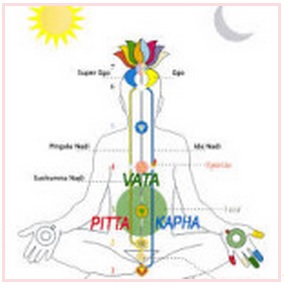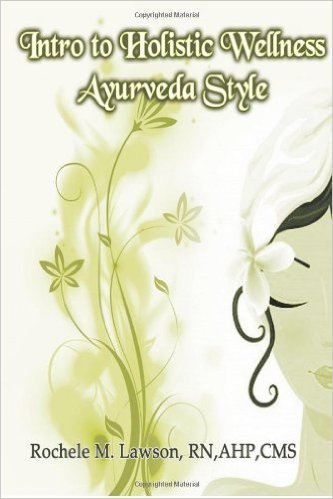I am always getting asked about Ayurveda and what the Doshas are and why it is important to know this information, so I decided to write an article explaining the Doshas and how this information can assist you.
Ayurveda assists the body in journeying back to optimal health by balancing the five elements in the body and mind through the use of herbs, diet, colors, aromas, lifestyle changes, yoga, and meditation along with other five sense therapies. The rejuvenative and cleansing therapies (Panchakarma) help nourish our bodies while calming our minds from the stresses of modern daily life.
Your inner nature is called your constitution or prakruti, and is an individual blend of the three doshas, Vata, Pitta, and Kapha. Your unique balance of these three energies was determined at the moment of conception and is with you the rest of your life. It determines what is in harmony with your nature and what will cause you to become out of balance, sick, and diseased. Knowledge of your constitution is essential to developing optimal health. Your constitution determines how you react to various foods, colors, aromas, and general life habits.
Recently, Ayurveda has had a profound impact upon the world of health care. Popular books by Deepak Chopra, M.D., and others have called attention to the potential of this ancient healing system. Along with the potential to heal chronic diseases, Ayurveda promises to improve health and increase longevity.
Ayurveda is considered the healing side of Yoga. Likewise, Yoga is the spiritual side of Ayurveda. Both Ayurveda and Yoga strive to help a person re-connect to their true nature through direct experience. Together, they encompass a complete approach to the well being of the body, the mind, and the spirit.
About the Doshas
Your constitution or Prakruti is the fundamental and unique balance of three basic energies called doshas. These are Vata, Pitta and Kapha. The balance in each individual is different; hence, each individual has his or her own special set of challenges and gifts. For this reason no two programs are identical, and each person’s path toward optimal health is unique.
Vata
The Vata dosha is said to be made up of the air and ether elements. This means that it has qualities that are similar to these elements. Vata is very much like the wind – it is light, cool, dry and mobile. In the body those people with a Vata nature experience more of these qualities. Their bodies tend to be light, their bones thin, and their skin and hair dry. They often move and speak quickly. When out of balance, they may lose weight, become constipated, and have weakness in their immune and nervous systems.
These qualities are also reflected in the personality. Those with a Vata nature tend to be talkative, enthusiastic, creative, flexible, and energetic. Yet when out of balance, they may also become easily confused and overwhelmed, have difficulty focusing or making decisions, and have trouble sleeping. This becomes more apparent when they are under stress. They are challenged by cool emotions like worry, fear and anxiety.
In order to bring balance to Vata, programs are designed that emphasize the opposing qualities of warmth, heaviness (nourishment), moistness and stability. In the diet this is reflected in the consumption of cooked grains such as rice and cooked vegetables as well as the intake of warm milk with spices. Pungent herbs like ginger that increase internal heat and nourishing herbs like ashwagandha bring balance to Vata.
Pitta
 The Pitta dosha is said to be made up of the fire and water elements. Fire is more predominant, and those people with a predominant Pitta nature have many of the qualities of fire within them. Pitta tends to be hot, sharp and penetrating. It is also somewhat volatile and oily. The oily nature of Pitta is related to the secondary component of water. People with a Pitta nature reflect these qualities. They tend to feel warm, have somewhat oily skin, penetrating eyes, and sharp features. They tend to have moderate weight and good musculature. When out of balance, they tend toward diarrhea, infections, skin rashes, and weakness in the liver, spleen, and blood.
The Pitta dosha is said to be made up of the fire and water elements. Fire is more predominant, and those people with a predominant Pitta nature have many of the qualities of fire within them. Pitta tends to be hot, sharp and penetrating. It is also somewhat volatile and oily. The oily nature of Pitta is related to the secondary component of water. People with a Pitta nature reflect these qualities. They tend to feel warm, have somewhat oily skin, penetrating eyes, and sharp features. They tend to have moderate weight and good musculature. When out of balance, they tend toward diarrhea, infections, skin rashes, and weakness in the liver, spleen, and blood.
These qualities are also reflected in their personalities. Pitta people tend to be highly focused, competitive, capable, courageous, energetic, and clear communicators, who get right to the point. They like to solve problems, and, when under stress, they dig in their heels. However, they can also become overly intense and speak with a sharp tongue. They make great friends but feared enemies. Emotionally, they are challenged by the heated emotions of anger, resentment, and jealousy.
In order to bring balance to Pitta, programs are designed to emphasize the opposing qualities of coolness, heaviness (nourishing) and dryness. Cool spices like fennel are recommended in the diet along with foods such as raw vegetables, cooked rice, and wheat as well as most beans. Sweet herbs like Shatavari are used to nourish the body, while bitters like dandelion root temper the fire.
Kapha
Within the Kapha dosha there is a predominance of the water and earth elements. Like these elements Kapha tends to be cool, moist, stable, and heavy. In the body these qualities manifest as dense, heavy bones; lustrous, supple skin; low metabolism; and large, stocky frames. In addition, those with a Kapha nature tend to feel cool. When out of balance, Kapha individuals are prone to gaining weight and tend to have weaknesses in their lungs and sinuses, where there is an accumulation of mucous. Those of Kapha nature are also most prone to non-insulin-dependent diabetes mellitus.
The elements of water and earth are also manifested in the personality. The heavy, stable nature of Kapha is reflected in a steady personality that is not prone to quick fluctuations. Those with a Kapha nature handle stress very well, often not even noticing that it exists. They don’t like change, are generally conservative, and would prefer to keep things just the way they are. Those with a Kapha nature are also comfort seekers. This relates to the soft, watery nature of Kapha. Too much comfort, however, can lead to a lack of motivation and a feeling of becoming stuck. When Kapha is out of balance, the heavy emotions of depression and lethargy result.
In order to bring balance to a Kapha nature, the opposing qualities of lightness, dryness, and warmth are recommended. Grains such as quinoa and amaranth are recommended as well as hot spices like cayenne pepper. Lots of vegetables and very little nuts or dairy are prescribed. Cleansing herbs like guggul and pungents like clove bring balance to Kapha. For more information on how Ayurveda can help you contact me at:
info@healthhealingwellness.com
Wishing you much health, healing and wellness!
Wishing you peace to your mind, wellness to your body and tranquility to your spirit.






